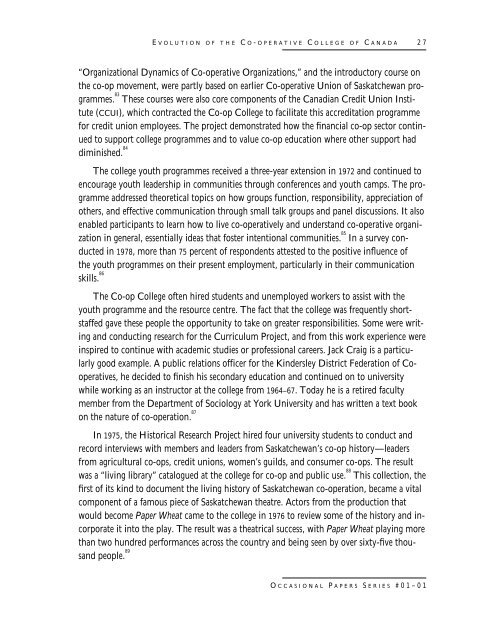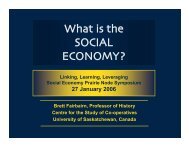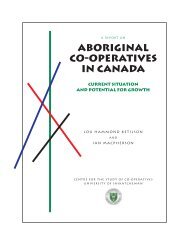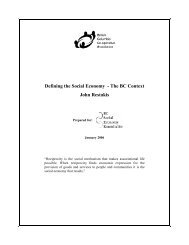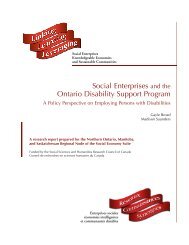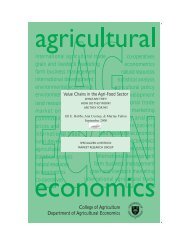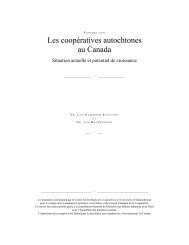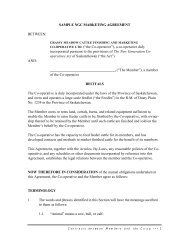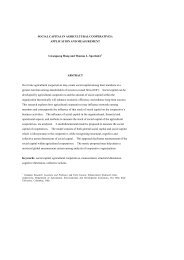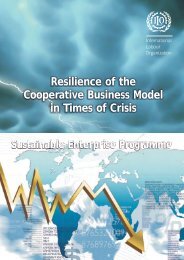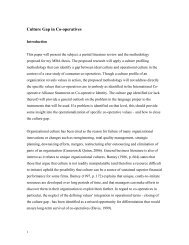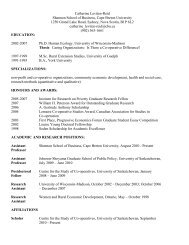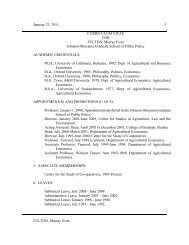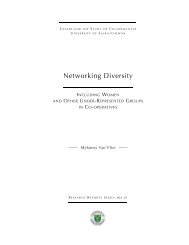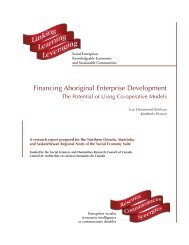Co-op College History - Centre for the Study of Co-operatives
Co-op College History - Centre for the Study of Co-operatives
Co-op College History - Centre for the Study of Co-operatives
Create successful ePaper yourself
Turn your PDF publications into a flip-book with our unique Google optimized e-Paper software.
E VOLUTION OF THE C O - OPERATIVE C OLLEGE OF C ANADA 27<br />
“Organizational Dynamics <strong>of</strong> <strong>Co</strong>-<strong>op</strong>erative Organizations,” and <strong>the</strong> introductory course on<br />
<strong>the</strong> co-<strong>op</strong> movement, were partly based on earlier <strong>Co</strong>-<strong>op</strong>erative Union <strong>of</strong> Saskatchewan programmes.<br />
83 These courses were also core components <strong>of</strong> <strong>the</strong> Canadian Credit Union Institute<br />
(CCUI), which contracted <strong>the</strong> <strong>Co</strong>-<strong>op</strong> <strong>Co</strong>llege to facilitate this accreditation programme<br />
<strong>for</strong> credit union employees. The project demonstrated how <strong>the</strong> financial co-<strong>op</strong> sector continued<br />
to support college programmes and to value co-<strong>op</strong> education where o<strong>the</strong>r support had<br />
diminished. 84<br />
The college youth programmes received a three-year extension in 1972 and continued to<br />
encourage youth leadership in communities through conferences and youth camps. The programme<br />
addressed <strong>the</strong>oretical t<strong>op</strong>ics on how groups function, responsibility, appreciation <strong>of</strong><br />
o<strong>the</strong>rs, and effective communication through small talk groups and panel discussions. It also<br />
enabled participants to learn how to live co-<strong>op</strong>eratively and understand co-<strong>op</strong>erative organization<br />
in general, essentially ideas that foster intentional communities. 85 In a survey conducted<br />
in 1978, more than 75 percent <strong>of</strong> respondents attested to <strong>the</strong> positive influence <strong>of</strong><br />
<strong>the</strong> youth programmes on <strong>the</strong>ir present employment, particularly in <strong>the</strong>ir communication<br />
skills. 86<br />
The <strong>Co</strong>-<strong>op</strong> <strong>Co</strong>llege <strong>of</strong>ten hired students and unemployed workers to assist with <strong>the</strong><br />
youth programme and <strong>the</strong> resource centre. The fact that <strong>the</strong> college was frequently shortstaffed<br />
gave <strong>the</strong>se pe<strong>op</strong>le <strong>the</strong> <strong>op</strong>portunity to take on greater responsibilities. Some were writing<br />
and conducting research <strong>for</strong> <strong>the</strong> Curriculum Project, and from this work experience were<br />
inspired to continue with academic studies or pr<strong>of</strong>essional careers. Jack Craig is a particularly<br />
good example. A public relations <strong>of</strong>ficer <strong>for</strong> <strong>the</strong> Kindersley District Federation <strong>of</strong> <strong>Co</strong><strong>op</strong>eratives,<br />
he decided to finish his secondary education and continued on to university<br />
while working as an instructor at <strong>the</strong> college from 1964–67. Today he is a retired faculty<br />
member from <strong>the</strong> Department <strong>of</strong> Sociology at York University and has written a text book<br />
on <strong>the</strong> nature <strong>of</strong> co-<strong>op</strong>eration. 87<br />
In 1975, <strong>the</strong> Historical Research Project hired four university students to conduct and<br />
record interviews with members and leaders from Saskatchewan’s co-<strong>op</strong> history—leaders<br />
from agricultural co-<strong>op</strong>s, credit unions, women’s guilds, and consumer co-<strong>op</strong>s. The result<br />
was a “living library” catalogued at <strong>the</strong> college <strong>for</strong> co-<strong>op</strong> and public use. 88 This collection, <strong>the</strong><br />
first <strong>of</strong> its kind to document <strong>the</strong> living history <strong>of</strong> Saskatchewan co-<strong>op</strong>eration, became a vital<br />
component <strong>of</strong> a famous piece <strong>of</strong> Saskatchewan <strong>the</strong>atre. Actors from <strong>the</strong> production that<br />
would become Paper Wheat came to <strong>the</strong> college in 1976 to review some <strong>of</strong> <strong>the</strong> history and incorporate<br />
it into <strong>the</strong> play. The result was a <strong>the</strong>atrical success, with Paper Wheat playing more<br />
than two hundred per<strong>for</strong>mances across <strong>the</strong> country and being seen by over sixty-five thousand<br />
pe<strong>op</strong>le. 89<br />
O CCASIONAL P APERS S ERIES #01–01


